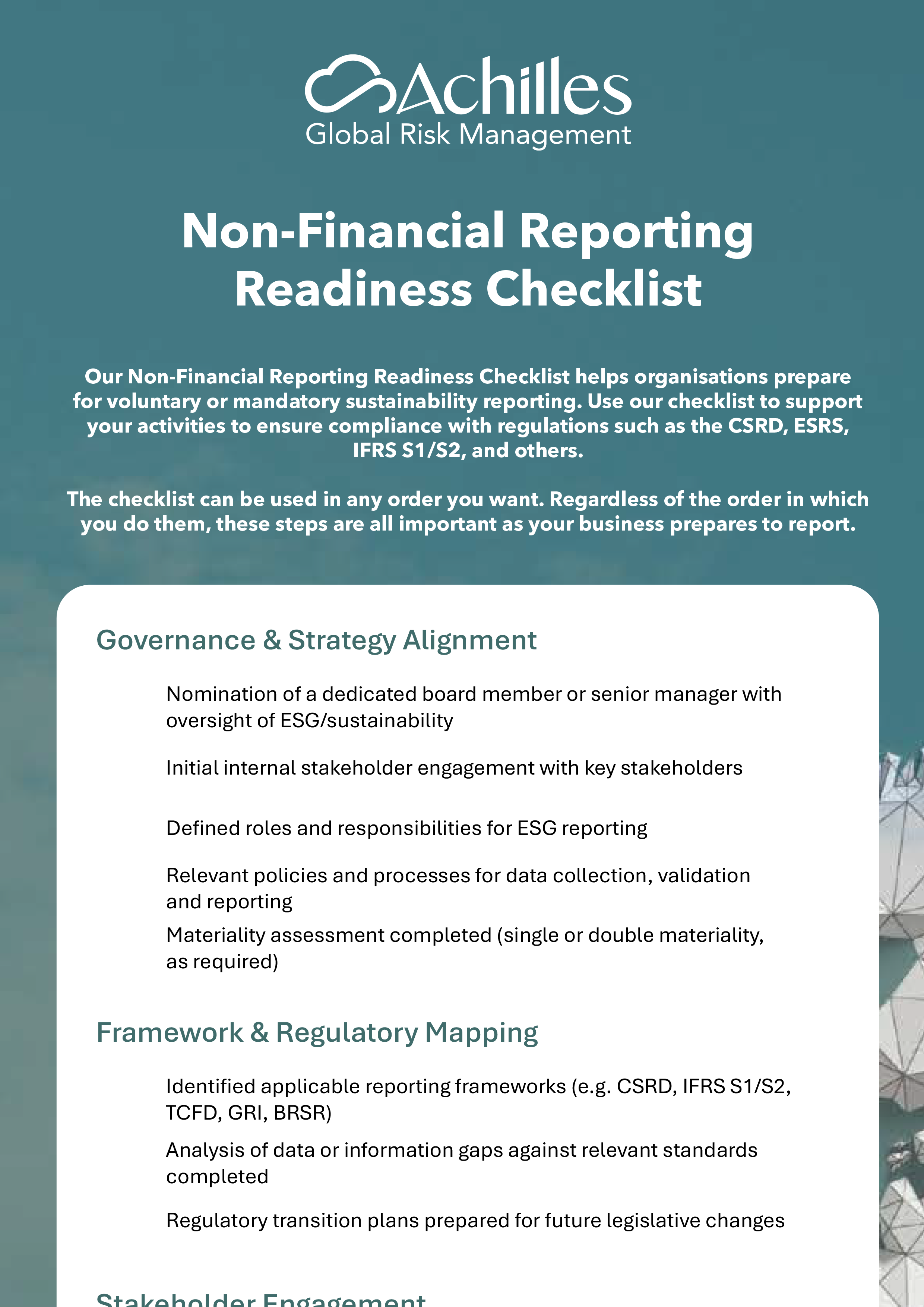Navigating Non-Financial Reporting
New rules are reshaping how businesses disclose environmental, social, and governance (ESG) data. Are you ready?

New rules are reshaping how businesses disclose environmental, social, and governance (ESG) data. Are you ready?

ACHILLES INSIGHT
Regulatory expectations are expanding fast, affecting more companies, across more regions, than ever before. Whether driven by the EU’s Corporate Sustainability Reporting Directive (CSRD), ISSB global standards, or new climate disclosure rules in the U.S., the direction of travel is clear: ESG transparency is becoming a business requirement.
But with evolving frameworks, jurisdictional overlaps, and complex value chains, reporting accurately and confidently remains a challenge.

Expands mandatory ESG disclosures to over 50,000 companies—including non-EU businesses with significant EU activity.

Establishes a baseline for sustainability and climate reporting, already being adopted by countries like the UK, Canada, and Japan.

Introduces climate-related disclosure obligations for public companies focused on risk, governance, and emissions.
Effective ESG reporting starts with knowing which rules apply and when. A focused, materiality-based approach helps prioritise what matters most. Success depends on collaboration across teams, access to reliable supplier data, and flexible systems that can adapt as standards evolve.
Cut manual effort, enable cross-functional collaboration, and support real-time progress tracking – while meeting your stakeholder obligations in full.
Streamline CSRD reporting of your direct risks, impacts and opportunities with Achilles advanced AI. Auto populate all data and narrative questions with 94% accuracy from any source including document uploads and internal systems.
Automate the collection, calculation, and disclosure of greenhouse gas (GHG) emissions data, reducing complexity and helping your business meet both carbon reduction goals and CSRD reporting requirements with ease.
Simplify supply chain data collection and assessment and deliver fast, accurate, and audit-ready supplier data that fully meets global reporting requirements – All risks, all suppliers, all geographies.
ACHILLES INSIGHT
Understanding applicability: Which rules apply, when, and where?
Data availability: ESG data often sits across siloed teams—or isn’t tracked at all.
Supplier insight: Supply chain data, especially on Scope 3 emissions or social risk, is hard to verify.
Framework alignment: Adapting internal reports to CSRD, GRI, ISSB, SASB, and others requires time and expertise.
Audit-readiness: Regulatory reporting requires clear, traceable, and consistent information.


Download your comprehensive guide to non-financial reporting including latest legislation, best practice, advice and guidance.
QUIZ
Even the most experienced procurement and supply chain professionals admit to feeling overwhelmed by this new era of ESG regulation and reporting. How good is your non-financial reporting knowledge?

ACHILLES INSIGHT
Supply chain due diligence legislation and value chain impacts are not easy subjects to understand. It can take years to understand all the different legislation and terminology. In this post we explain some of the most common jargon terms you are likely to come across – particularly if you are working in procurement or sustainability.

ACHILLES INSIGHT
Sustainability is rising up the corporate agenda—and with regulations like the CSRD, businesses must now show they understand not just how the world affects them, but how they affect the world. A materiality assessment helps identify the issues that matter most. This blog explores how the concept of materiality takes that further, balancing financial risk with broader social and environmental impact.

RESOURCES
Prepare your organisation for the demands of non-financial reporting with our Interactive Readiness Checklist. Whether you’re tackling CSRD, IFRS S1/S2, or other frameworks, this practical tool breaks the process into clear, actionable steps covering everything from data systems and governance to stakeholder engagement and assurance. Use it to identify gaps, structure your approach, and ensure nothing slips through the cracks. Download now to simplify your sustainability reporting journey and stay one step ahead of evolving regulations.

